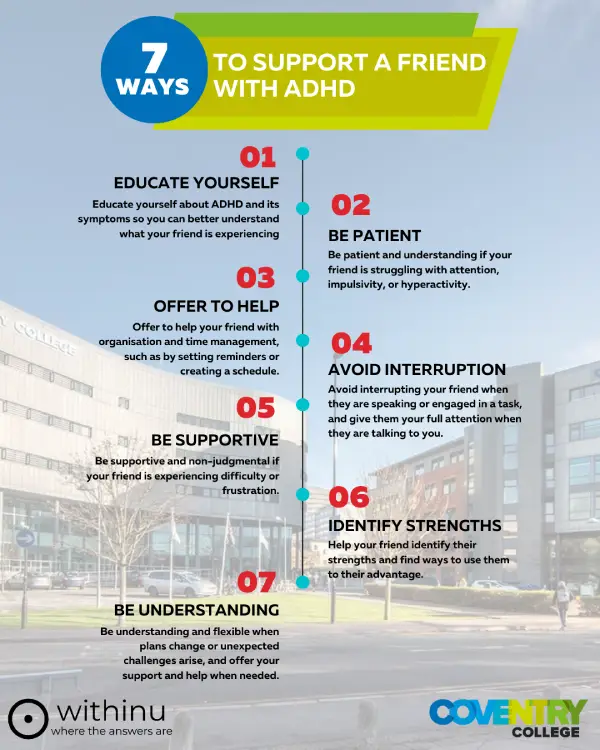
7 Ways to Support a Friend with ADHD
The natural variation in brain shape and function in the human population is called neurodiversity. It acknowledges that people with conditions including autism, ADHD, dyslexia, and dyspraxia have distinctive strengths and struggles. These distinctions should be acknowledged and cherished rather than seen as deficiencies or disorders.
In contrast to the conventional medical model of mental health, which sees these disorders as abnormal and in need of treatment, neurodiversity contradicts this approach. Instead of expecting people with neurodiversity to conform to neurotypical norms, it acknowledges that neurodiversity is a natural and valued component of human diversity. These individuals should be given the assistance and accommodations they need to thrive on their own terms.
In recent years, the neurodiversity movement has grown in popularity and acceptance, which has changed how people with neurodiversity conditions are perceived and supported. One example of this shift can be seen in how we support individuals with ADHD, where understanding and accommodation have replaced outdated approaches focused solely on “fixing” behaviours.
Supporting Someone with ADHD: A Practical Guide
If you have a friend or colleague with ADHD, here are seven ways to provide meaningful support while honouring neurodiversity principles:
1 Educate Yourself
Educate yourself about ADHD and its symptoms so you can better understand what your friend is experiencing.
2 Be Patient
Be patient and understanding if your friend is struggling with attention, impulsivity, or hyperactivity.
3 Offer to Help
Offer to help your friend with organisation and time management, such as by setting reminders or creating a schedule.
4 Avoid Interruption
Avoid interrupting your friend when they are speaking or engaged in a task, and give them your full attention when they are talking to you.
5 Be Supportive
Be supportive and non-judgmental if your friend is experiencing difficulty or frustration.
6 Identify Strengths
Help your friend identify their strengths and find ways to use them to their advantage.
7 Be Understanding
Be understanding and flexible when plans change or unexpected challenges arise, and offer your support and help when needed.
The journey toward a more neurodiverse-inclusive society begins with individual actions and understanding. Whether supporting a friend with ADHD, a colleague with autism, or a family member with dyslexia, the principles remain consistent: education, patience, and genuine acceptance. By following practical steps like those outlined above and embracing the broader philosophy of neurodiversity, we can all contribute to creating environments where neurological differences are not just accommodated, but valued as essential threads in the tapestry of human experience.
This shift in perspective benefits not only neurodiverse individuals but enriches our entire society through increased innovation, creativity, and diverse ways of thinking and problem-solving.


